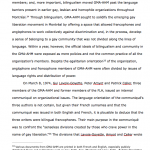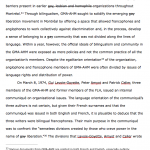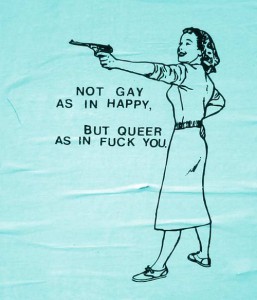Fucking Up History
The liberty to fuck something up—to deform it, and accept the fragments—would seem to be a chimerical opportunity to a fledgling PhD student, but we all are quite aware that liberty never comes without parameters and consequences. It is quite simple to conflate fucking something up with deconstruction, and in many ways, this simple conflation may perform as the foundational steps to deform an object, but the difference lies in the fragments.
I began working on this bootcamp as an experiment in fucking up popular visual culture, and I immediately realized that writing about James Franco and Seth Rogan’s Bound 3 would be a really entertaining enterprise. The results manifested in more as a probe than a bootcamp exercise—I cannot take credit for Bound 3’s fuck up, I had to fuck up something of my own. I turned to my MA thesis as the object to deform, to take out my stress and memories of sleepless nights and push my thesis off the wall like Humpty Dumpty. It was an object that I wrote, that I created, so if anyone was going to fuck it up, it would be me.
My MA thesis explored networks of solidarity and spaces of fragmentation during the nascent gay and lesbian movement in Montréal, with a particular focus on anglophone-francophone relations. I was certainly not the first scholar to write about gay and lesbian Montréal, but I was sure that I had a fresh perspective of the history. The result seemed to be fine, but like any good thesis, it was just a completed thesis. I have rarely looked back. For this bootcamp, I realized that I needed to return to an object that at one was so important to me, an object that consumed me and transformed me into my current self. I decided that I would select a passage from my thesis, and remove any reference to homosexuality. I did not intend to deconstruct my thesis, I wanted to deform the scholarship. “Deformative scholarship is all but forbidden, the thought of it either irresponsible or damaging to critical seriousness. It exists nonetheless, and in certain cases it has gained justifiable distinction and importance.” (Samuels and McGann) Maybe fucking up this object would finally breathe new life into it.
I deleted the keywords gays and lesbian to deform history to understand how historians have, and to continue to, perform this act of homophobic and heteronationalist erasure. Yet as I worked on it, I began realize that while the removal of the keywords did unravel a history of nationalism, but this was no surprise as I weaved in a critique of the Quiet Revolution as a palimpsest to the object. But I was not attempting to critique my thesis to discover layers that lie beneath the surface, I wanted to tear it apart and step back to marvel at the pieces. One could argue that a critique would have sufficed, and I could write about another failed bootcamp, but “this fact raises a second matter of importance: that criticism (scholarship as well as interpretation) tends to imagine itself as an informative rather than a deformative activity.” (Samuels and McGann) I was not searching for an informative result, I was not satisfied with just criticism, I wanted to go beyond deconstruction.
As I looked through the “new” text once again, I was reminded of other keywords that were not deleted from the text, but were never included in the first place. These keywords were inclusive of anything dealing with race, ethnicity, (im)migration, and settler colonialism. This was the issue with the thesis, and continues to be the issue with almost any scholarship concerning gay and lesbian Montréal. This bootcamp allowed me to develop a perspective on fucking up an object—all objects are fucked to begin with, we just need to continue “tear[ing} apart existing structures and use the scraps.” (Menkman) Menkman asserts “deformation that doesn’t strive to put the humanities back together and reestablish the integrity of a text, but rather, a deformation that is a departure, leading us somewhere new entirely,” (Menkman) and I believe that a departure from standardized “interdisciplinary” methods is absolutely critical for engaging in the type of research that does not simply concede with the parameters or consequences of deconstruction.
—————————————-
Menkman, Rosa. “Glitch Studies Manifesto.” Video Vortex Reader II: Moving Images Beyond YouTube. Amsterdam: Institute of Network Cultures, 2011. 336–47.
Rodríguez-Arbolay Jr, Gregory Pablo. Chapter 3 Excerpt from MA thesis, Connecting Fragments: Solidarity and Fragmentation in Montréal’s Lesbian and Gay Communities, 1960-1977: Rodríguez-Arbolay, Gregory P. “Shifting Liberation Spaces: Mixed Gay and Lesbian Organizations,” Women’s History Graduate Program Newsletter 13.1(2009).
Samuels, Lisa, and Jerome McGann. “Deformance and Interpretation.” New Literary History 30.1 (1999): 25–56. Print.



